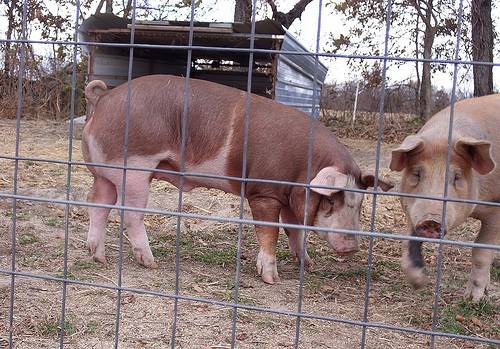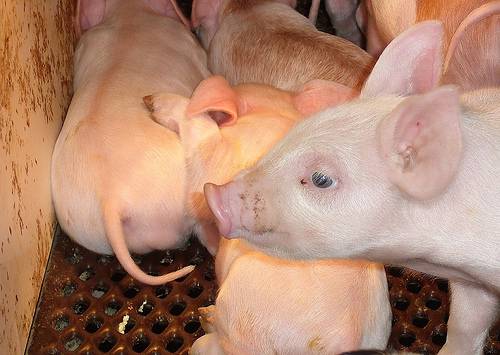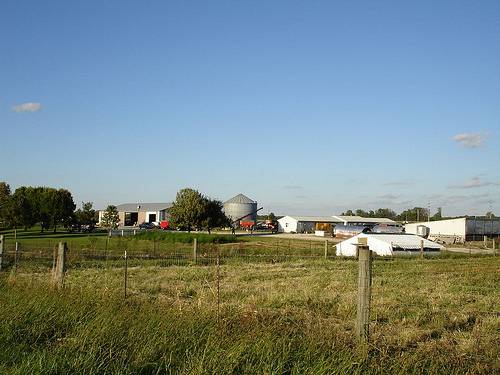An ongoing examination of what it means to “eat local.“ Please read the previous stories here:
Part 1 & Part 2: A profile of local food blogger Scott Koeneman
Part 3: Farmers’ Markets
Part 4: CSAs
Part 5: Common Ground, Strawberry Fields, & Bacaro
Triple ‘S’ farms owner Stan Scott Shutte was born into a farming family, so he has been farming for more than 40 years. Though Shutte used to be a conventional farmer, growing corn and soybeans and using conventional farming methods, he now raises animals on Triple ‘S’ Farms, and his farm is Certified Organic.

Shutte works with three other employees on the farm – an operations manager, a farm manager and a farm supervisor. He also employs a laborer.
“I am there to do whatever I need to do…deliveries, the lowest job, anything,” Shutte said. “I keep the ship afloat…I take care of the animals and the customers.”
Triple ‘S’ Farms employees don’t raise their own beef, Shutte said; instead they buy calves at five months old.
“They have just been weaned and we raise them for another year on our farm,” Shutte said. “They are about 17-months-old when we send them to slaughter.”
Hogs are bought and weaned from their mothers when they are five weeks old; they are then raised on the farm, Shutte said. Five months later, the pigs go to slaughter.

“They are about six months old at that point,” Shutte said. “You just know when they are ready. Usually they are all about the same size.”
Shutte said that the meat itself cannot be considered Certified Organic; it is Shutte’s farm that boasts the USDA Organic certification, meaning that the meat produced there is raised under organic standards. This certification ensures that Triple ‘S’ Farms animals are fed fresh, organic feed that is untreated by chemicals.
Shutte said he thinks livestock raised on organic farms tastes better than commercially produced meat.
“There is a lot more than just the feed that contributes to how an animal’s meat tastes – the genetics of the animal, the way it is treated, the environment,” Shutte said. “There are a lot of things that contribute to a quality animal…and the bigger it is, the more that matters.”
One of the biggest challenges of running the farm, Shutte explained, is dealing with the weather, which in turn affects the health of his animals and the farm’s overall profitability.
“The feed is affected by weather…and if you don’t raise enough feed, you have to buy it, which raises your costs,” Shutte said. “The animals don’t like the cold weather or the hot weather, and the chickens don’t like wet weather.”
In such situations, the animals often contract diseases and die, Shutte said.
“It is no different for humans,” he noted. “If [the conditions are] not fit for a human, [they are] not fit for an animal.”
Triple ‘S’ Farms started selling meat at the Decatur and Springfield farmers’ markets in 1999, and has been selling at Urbana’s Market at the Square since 2003. Shutte noted that customers at every market have wanted to know where their food is coming from.
“Whether or not [the animals are] humanely raised is a big issue,” Shutte said. “People want to be sure that they aren’t buying meat from livestock that was raised in confinement, in confined animal feeding operations (CAFOs).”
Shutte said that eating locally produced food is how consumers can ensure better food quality and increased food security.
“The more hands that touch your food – in the bigger processing plants – the more chances that something can go wrong with it,” he said.

According to Shutte, eating local is more important than eating organic.
“You can buy organic from Mexico or China produce-wise, but that helps no one,” he said. “I would rather you buy local than buy organic that has been shipped that far, because you don’t know what has happened to it on the way.”
Shutte also pointed out that most customers enjoy getting to know their local farmers.
“The way I look at it, folks have a doctor, a lawyer, a dentist…they need a farmer, too,” he said. “I feel a farmer is more important than the rest…even more important than a doctor. If you eat healthy and know what you’re eating, you can prevent a lot of things.”
Shutte said that an informed consumer is a good consumer.
“Not everybody cares, and that’s fine, but there are enough people who do care about what they eat to keep my farm going,” he said. “You can’t convert everybody.”








